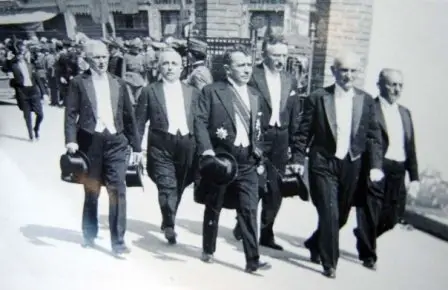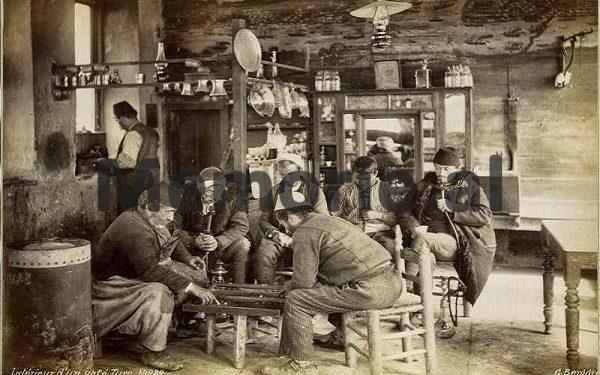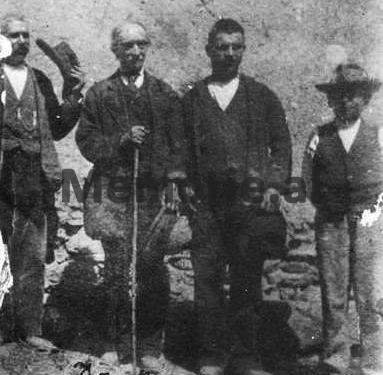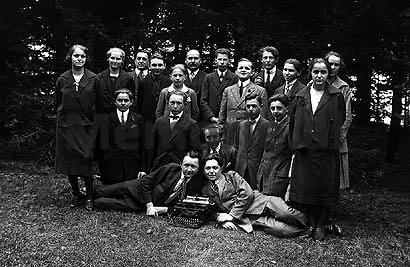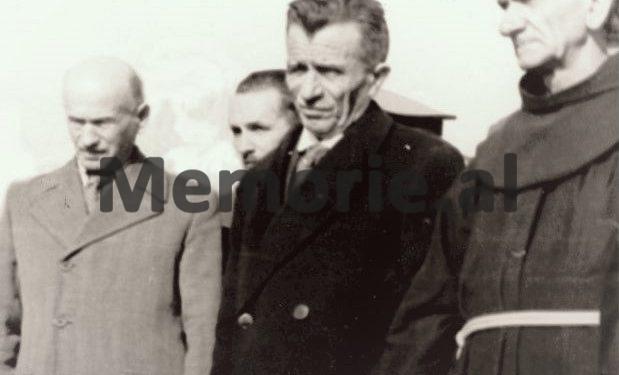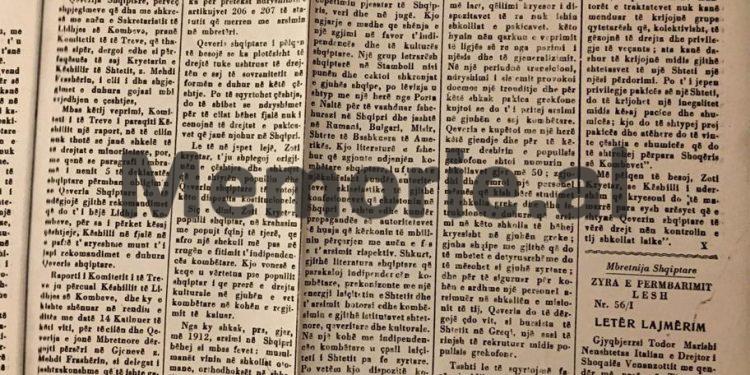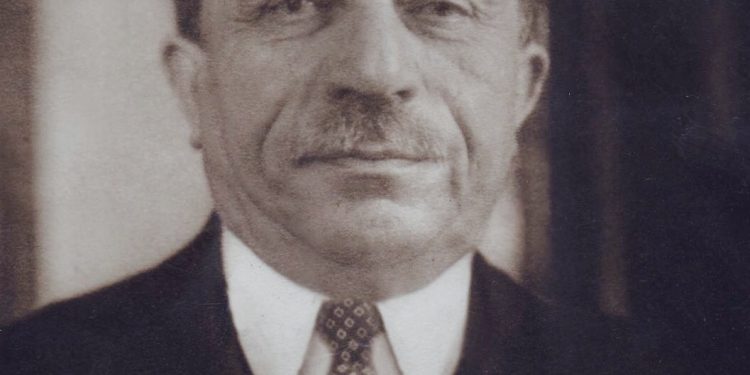Dashnor Kaloçi
Memorie.al publishes the unknown speech of the Albanian representative in the League of Nations, Mehdi Frashëri, held in Geneva in 1935, where the prominent diplomat gave detailed explanations on the complaints made by the Greek side regarding the treatment of national minorities in Albania and learning their mother tongue. How was the speech of Mehdi bej Frashëri received by the League of Nations, and how were the foreign delegations convinced at that meeting, that not Albania, but other inter-Balkan states that did not respect the rights of Albanian minorities?! As the Tirana newspaper “BESA” covered all the claims of the Greek side for the Greek minorities in Albania and the speech of Mehdi bey Frashëri in the League of Nations, who, addressing that problem legally, opposed them with facts, documents and convincing arguments, showing all those present, that it was not Albania that did not respect national minorities, but on the contrary, its neighboring countries!
Nearly 14 years ago, or more precisely on May 22, 2007, several articles were published in the Bulgarian media stating, among other things: that in Albania there is currently an ethnic Bulgarian minority of 100,000 people, whose rights have not been fulfilled. more elementary by the Albanian state and government, starting from the opening of schools in their language, etc., etc. Although these allegations (which were also reflected in some online forums, about the existence in Albania of an ethnic Bulgarian minority of 100,000 people were not official statements of the Sofia government, but of certain Bulgarian circles, should not be forgotten that such rumors are already an old and outdated image, not only of those Bulgarian circles that inflate them, but also in the history of Albania’s relations with some inter-Balkan states.
If we refer to the past history, such campaigns with stale claims and without any basis, in the address of Albania have been made since the creation of its independent state in November 1912, and onwards, until the days of today. These absurd claims came not only from the Bulgarians, but also from the Serbs and especially the Greeks, who in the mid-1930s, the issue of “disrespect for the rights of the Greek minority” in Albania, led to the League of Nations. At that time, this came after the closure of private schools in Albania by the Albanian government, which as a result closed Greek schools that had been opened in several towns and villages in the south of our country, where there was a small Greek minority.
To report the problem in question, namely: to defend itself against the accusations of the Greek side which accused the Albanian state of “disrespecting the rights of national minorities”, the Albanian government sent to the League of Nations in Geneva, its permanent representative, the famous diplomat and politician, Mehdi bej Frashëri, who in his report, explained with convincing facts and arguments, the accusations of the Greek delegation. He even convinced all the representatives who participated in that meeting that Albania was not the one that did not implement and respect the rights of national minorities, but the Greek side and other Balkan states did not respect the Albanian minority living in those countries.
In this regard, in addition to the full speech of Mehdi Frashëri in the League of Nations, which Memorie.al is publishing in full in this article, we are also giving the reaction of one of the many Albanian newspapers that raised their voice against the absurd accusations of the Greek government, for “disrespect of its minorities in Albania”.
The reaction of the newspaper “Besa” for the ‘complaints’ of the Greek side!
The whole world knows that since a few months ago, the Greek-speaking minority in the Kingdom of Albania, has made several complaints to the League of Nations regarding its schools, which so far in the national press and in foreign notebooks, has been said several times. This issue in itself should not have mattered; but, in the neighboring state, since the political parties have become very hard on each other, of which that of the Venizalists, which opposes the government of Mr. Caldaris, under this pretext wanted to trigger a storm in a glass of water. It is surprising that the Greek government, not only that of Mr. Caldaris, which is a relatively smart and modern government, but also all the previous governments of Greece, have not respected any rights of the minorities that have taken over like this. It is time to reiterate that our neighbors see neither a minority right for either Albanians or Slavophones, who are in the hundreds of thousands on their land, and are now asking how and why to extend Mr.’s government. Caldaris, taking advantage of the fact that our Royal Government took under its direct control all the schools of both the majority and the minority. In order not to prolong the development of the goals for what we said above, today we are able to publish the details of the complaint in question, according to the documents published by the Secretary General of the League of Nations, which, although they speak for themselves, with all this we would like to mention to our singers some important points. The delegates instead of denying them, directly or indirectly, as the Greek delegates have done in other cases, instead have asserted the rights of minorities as an Albanian government that represents the character of the Albanian people, i who does not violate the word he has given. In the defense that we will list below, it will be understood that the nationalization of schools that happened in our State was not an arbitrary or capricious act. But, as our delegate Mr. explained very nicely. Mehdi Frashëri in the Council of the League of Nations, responds exactly to an Albanian historical need, which was felt a long time ago. In short, it was stated in the speeches of our delegate that the law has a general character and was not made in order to violate the rights of minorities; for a right is considered a minority right when that right is also held by the majority, because the preservation of a right by the minority and its suppression by the majority, forms a privilege and is not a right. And our delegate, Mr. Mehdi Frashëri, in this delicate argument did not use any brand new reason or any weapon invented now quickly, but used the word and the weapon of his adversar (his counterpart, our note), the Greek delegate, Mr. Denkarmis , who, an analogous case, developed this principle in 1912, at the League of Nations by the Greek-speakers, against the Royal Government of Albania, first referred to a special committee composed of the delegate of England, Mr. Mollkin, from the Portuguese delegate, Mr. Vaskongelo, and from the Mexican delegate. The Albanian Government, in addition to the explanations given in writing to the League of Nations, submitted to the Committee of the Three a report to the Council, in which it states that the rights of minorities have been violated, but since the last paragraph of Article 5 of the Albanian declaration contains the obligation that the Albanian Government hears all the recommendations that will be made by the League of Nations, regarding this issue, the Council in question, if unreasonable, may give the necessary recommendations to the Albanian Government. The report of the Third Committee was forwarded to the Council of the League of Nations, and it had marked it on the agenda on 14 Kallnuer (January) of this year, for which our Royal Government sent again to Geneva Mr. Mehdi Frashëri, as the extraordinary delegate who would be ready at that meeting. This time the rapporteur of this issue was elected the Spanish delegate Mr. Madariaga, who had prepared a report, where, after listing the contents of the acts, explanations and opinion of the Committee of Three, again ended not in the violation of minority rights by the Royal Government of Albania, but expressed the opinion that this Government Council to make appropriate recommendations. After the Council convened and the rapporteur sang his report, the Chairman of the Council gave the floor to our delegate, Mr. Mehdi Frashërit, who in a meeting, which was also attended by a large majority of representatives of the world press, gave the speech we note below, which was heard with great attention by all those who happened.
Speech by Mehdi bey Frashëri, at the League of Nations
Mr. Chairman, gentlemen
From the day Albania was admitted to the League of Nations, all the delegates of the Albanian Government always appeared, whenever the opportunity arose, in favor of the protection of minorities, because minorities of race and language in Albania are very few, while Albanian minorities in neighboring States, there are hundreds of thousands; why Albania, before being admitted to the League of Nations, which, with the declaration of its independence on November 28, 1912, automatically recognized the rights of the minorities located in its national lands; why the government wants to honor the obstacles taken towards the League of Nations; The Albanian Government is fully convinced that respect for minority rights corresponds to a principle of justice. So, the complaints addressed to the League of Nations by the Greek-speaking minorities in Albania, have as a pretext the change of articles 206 and 207 of the statute that deal with education in the kingdom. The Albanian government likes to believe that it is completely right in exercising the right of sovereignty in the proper form in this matter. If the issue is clarified, it will be seen that the changes in question do not violate the rights of minorities that have been recognized in Albania. Let permission be given, Mr. President, to explain to you the origin of the issue and the reasons that pushed the people and the Albanian Government to vote on these constitutional provisions. As you know, Mr. President, the Albanian people, compared to other neighboring peoples, was almost a century later on the path to gaining national independence. This bad delay proved why the Albanian people were deprived of their cultural rights in their national language during the previous regime. For this reason, until 1912, education in Albania was done according to religions; Muslims came to Ottoman schools, Orthodox came to Greek schools, and in districts close to the Slavs to Serbian or Bulgarian schools, Catholics came to Italian or Austrian schools; the high clergy of different religions that functioned in Albania were entirely of foreign nationality. For this reason, the clergy defended their own foreign language education. Such an anomaly could not be endured in the 19th and 20th centuries, known as the “centuries of light”.
“De Rada in Italy, the first spark of Albanian writing”
The first movement was given by the Albanians of Italy in 1848. At this time Professor De Rada wrote and published his patriotic poems in the Albanian language; in France, La Martini, to whom Professor De Rada sent some pieces of his poems translated into Italian, was still alive. Most of the Albanian poets and writers of Italy came after Professor De Rada under the names of Kamarada, Varibob, Marqino and others. All these Italian-Albanians in their homeland adopted for the unification of the Italian people against the Bourbons of Naples and in their publications in the Albanian language worked for the rebirth of their homeland of origin; the peasants came in large numbers after Garibaldi to realize the unification of Italy, with the promise that in case of victory he would work for the Albanian independence. Speaking about this, Giuzepe Garibaldi said: “My brave Albanians” and “the Albanian issue is mine”. These overseas publications invited Albanians to fight for their freedom and to learn in their own language, but they did not know the moral prohibitions that the country was striving against on this issue. Despite this, the above-mentioned publications gradually entered Albania and made their effects. This lasted until 1878, the date of the Congress of Berlin, which with its provisions violated the partial partition of Albania, north and south. This great event was a sign of an awakening in favor of Albanian independence and culture.
“The effort of the Albanians of Istanbul for the Albanian writing”
A group of Albanian writers in Istanbul started working and set the letters in Albanian, but the movement was immediately suppressed by the High Gate to continue secretly in Albania and abroad in Romania, Bulgaria, Egypt, United States of America. This hidden literature that aroused the Albanian national feeling, fought at the same time against the ecclesiastical authorities of all religions that existed in Albania and also against the propaganda of foreign authorities seeking to sow discord through religion and respective education. In short, all Albanian literature that surpassed national independence, foreshadowed with an energy the secularism of the state and world education and the nationalization of all state, governmental and cultural institutions. At a time with national independence, the secularism of the State without an official religion was proclaimed. But this constitutional provision alone could not ensure the ideal of moral unity, which was destroyed by the cultural change that had reigned for centuries among Albanians; therefore, the principle had to be applied in all branches of political and social activity. In 1929 the law belonging to the communities was published on the basis of which civil education was separated from religious education; the clergy of various denominations were denied the right to education for civilians, but were given complete freedom with regard to lower and upper religious education, namely catechism for the youth and theological education in seminaries for Catholics and Orthodox and the Madrasa for Muslims. Members of the former state pressed through the press the provisions of the law dealing with education, on the pretext that they opposed the freedom of education provided by the 1928 Constitution for all foreign nationals. For various internal reasons, these provisions remained dead letters in the hope that the schools created for civil education by the various denominations that reigned in Albania would change their behavior, under the pretext of education continued in their previous mistakes; for this reason, the Government thought to ensure in a definitive way the moral unity of the Albanian Nation in the future.
“Opening and completion of Greek schools”
The amendment to Articles 206 and 207 of the constitutional law abolishes all private schools, both domestic and foreign, and puts them under the proper control of the Government without exception. As a result of the implementation of the new constitutional principle, the entire education system was changed. As it turns out we said above, the main purpose of the new provisions were not minority schools. These came under the jurisdiction of the new law from the principle of unity and generalism. In a period of transition, the change of system necessarily provoked a shock and for this reason the Greek-speaking minority remembered that education in its national language would be cut off. The government immediately realized this situation and to satisfy the desire of the Greek-speaking population increased the number of schools to 50; selected and appointed a teaching staff who had studied in Greek schools and gave the necessary instructions that education in these schools be done mainly in Greek ‘Albanian, although it would remain compulsory, would be taught as an official language; and to provide for the time and future an educational staff in the scale of its mission, the Government will send each year, as State Scholars to Greece, a quantity of young people recruited among the Greek-speaking population.
“Legal treatment of the minority problem”
Let us now consider the legal phase of the case: The paragraph relating to the matter we are dealing with is worded in these terms: “Albanian citizens will in particular have an equal right to maintain, direct and control expenditures or to establish in the future charitable (charitable), religious or social institutes, schools and other educational institutions with the right to use their language freely, to practice their religion freely ”. The word “equal right”, used in this legal document with an international character is not dead, it must have a meaning, which in this case means a right enjoyed by the majority. Otherwise it cannot create an extraordinary right in favor of the minority. In other words, a right becomes less frequent when the majority has it, because otherwise it is not a right but forms a privilege. The constitutional law that has a general character for all the people, when it violates a right that the majority had, this right cannot remain for the minority; therefore, the change of the constitutional law does not violate the right of the minority. Delegate of Greece Mr. Dendramis, at the fourth meeting of the Sixth Commission of the Assembly in 1925, said: “The authors of the treaties did not intend to create groups of citizens who, collectively, enjoy special rights and privileges; they wanted to create a unit of use among all the citizens of a state. If privileges are given to the minority of a state, an illegality will be created between that minority and the majority; this would be suppressed by the minority and then the issue of the majority would be raised before the League of Nations. I like to believe, Mr. President, that the Honorable Council that you chair will take into account the reasons that pushed the Albanian Government to put secular schools under its control “./Memorie.al




